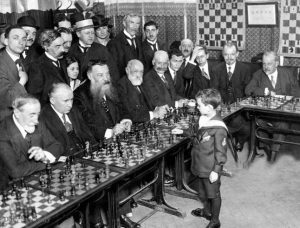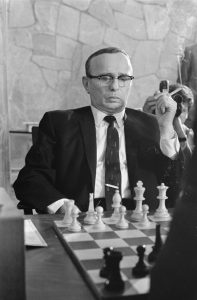 Mastery knows no age. Genius can occur in anyone, and of course, always presents itself when a child is very young. In 1920, one such genius, Samuel Reshevsky was busy mastering chess masters in France. Reshevsky learned chess when he was just 4 years old. He became known as a child chess prodigy and was playing simultaneous games of chess against adults when he was 6 years of age. At age 8 he was playing chess against strong players. Following the events of World War 1, Reshevsky immigrated to the United States. As a 9 year old, his first American simultaneous exhibition was with 20 officers and cadets at the Military Academy at West Point. He won 19 games and drew one. He toured the country and played over 1,500 games as a 9 year old in simultaneous exhibitions and only lost 8 games. In his early years he did not go to school and his parents ended up in Manhattan Children’s Court on charges of improper guardianship. In reality, little Samuel probably could have taught the teachers, so missing some of his education was not detrimental to him in any way.
Mastery knows no age. Genius can occur in anyone, and of course, always presents itself when a child is very young. In 1920, one such genius, Samuel Reshevsky was busy mastering chess masters in France. Reshevsky learned chess when he was just 4 years old. He became known as a child chess prodigy and was playing simultaneous games of chess against adults when he was 6 years of age. At age 8 he was playing chess against strong players. Following the events of World War 1, Reshevsky immigrated to the United States. As a 9 year old, his first American simultaneous exhibition was with 20 officers and cadets at the Military Academy at West Point. He won 19 games and drew one. He toured the country and played over 1,500 games as a 9 year old in simultaneous exhibitions and only lost 8 games. In his early years he did not go to school and his parents ended up in Manhattan Children’s Court on charges of improper guardianship. In reality, little Samuel probably could have taught the teachers, so missing some of his education was not detrimental to him in any way.
Reshevsky was a tough and forceful player who was superb at positional play, but could also play brilliant  tactical chess when warranted. He often used huge amounts of time in the opening, a dangerous tactic which sometimes forced him to play the rest of the game in a very short amount of time. That sometimes unsettled Reshevsky’s opponents, but at other times resulted in blunders on his part. Reshevsky’s inadequate study of the opening and his related tendency to fall into time-pressure may have been the reasons that, despite his great talent, he never became world champion; he himself acknowledged this in his book on chess upsets.
tactical chess when warranted. He often used huge amounts of time in the opening, a dangerous tactic which sometimes forced him to play the rest of the game in a very short amount of time. That sometimes unsettled Reshevsky’s opponents, but at other times resulted in blunders on his part. Reshevsky’s inadequate study of the opening and his related tendency to fall into time-pressure may have been the reasons that, despite his great talent, he never became world champion; he himself acknowledged this in his book on chess upsets.
Reshevsky never became a truly professional chess player. He gave up competitive chess for seven years, from 1924 to 1931, to complete his secondary education. He graduated from the University of Chicago in 1934 with a degree in accounting, and supported himself and his family by working as an accountant. Not everyone could leave off and then pick up their education and never miss a beat. Of course, when you have genius level intelligence, I guess that isn’t a problem.


Leave a Reply